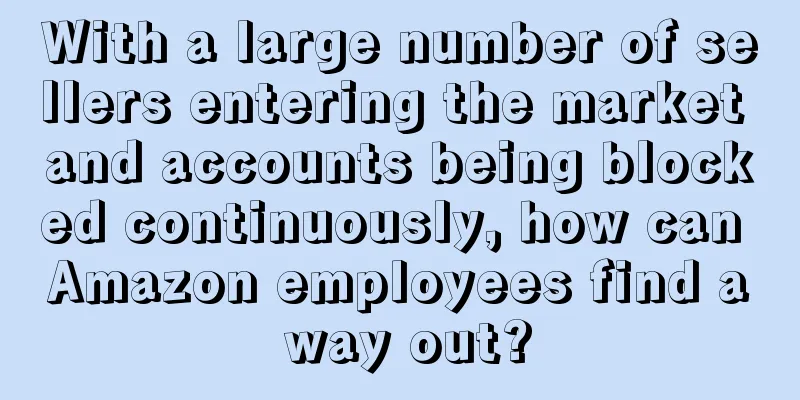Facebook rebates dropped sharply, and sellers said: the pressure is huge!

|
As one of the world's largest social media platforms, Facebook's advertising business has always been an important channel for corporate promotion.
However, starting from January 1, 2025, Facebook's rebate policy, which had been used for more than a decade, suddenly underwent major changes. The rebates for non-direct customer accounts were cut in half, and the rebates for direct customers dropped by 70%, causing many sellers to fall into anxiety.
Facebook rebates have shrunk significantly ! Sellers' profits are under pressure
The magnitude of this adjustment is beyond sellers' expectations and may cause some sellers' profits to drop by 20%-50% or even more. For sellers who have long relied on rebates to maintain their profits, this is undoubtedly a "life-or-death crisis." The originally considerable profit margins were instantly compressed to the extreme, and some sellers even began to worry whether they could survive this change.
Take a seller who mainly sells household goods as an example. In the past, he could earn tens of thousands of yuan in rebates from advertising costs of 100,000 yuan per month. But now with the new policy, his profits have been cut in half, and he is losing tens of thousands of yuan every month. His independent website project can no longer be maintained.
In the past, Facebook's rebate policy was to give sellers a corresponding rebate based on their advertising spending. This rebate is not only a reward for sellers' advertising investment, but also a real reduction in marketing costs. Many sellers will plan their annual advertising budget and sales expectations based on the rebate policy.
But now, Facebook's new policy has significantly reduced the rebate rate, which has made sellers who rely on rebates to maintain profits panic.
First, the rebate ratio has been greatly reduced, which means that sellers need to pay higher advertising fees to get the same exposure and clicks, because the part that was originally covered by the rebate now needs to be paid by the seller. This is undoubtedly a double whammy for small and medium-sized sellers who already have meager profits. They are facing the dilemma of soaring costs and severely compressed profits, and their living space is further squeezed.
Secondly, the dramatic change in the rebate policy has forced sellers to urgently adjust their advertising strategies. Time is running out, and they need to re-evaluate the market, set budgets, and optimize creative ideas in a short period of time to adapt to the new advertising environment. However, many sellers do not know what to choose in a panic, and the advertising effect is greatly affected.
With the substantial adjustment of Facebook's rebate policy, the market differentiation will become more serious. Large sellers with strong financial resources can rely on their own advantages to increase their advertising budgets, strive for limited market share, and further consolidate and expand their position in the changing situation. However, for small and medium-sized sellers with tight funds and limited resources, facing the rising advertising costs, it seems that it is only a matter of time before they are eliminated.
Profits have dropped significantly and sellers are struggling to survive!
An electronic product seller said in an interview with Ennet that before the policy change, he could earn $50,000 in rebates per month. This money was used as the company's additional profit for the next round of larger-scale advertising to further expand market share and profit margins. However, after the implementation of the new policy, the rebate ratio dropped significantly, leaving only $20,000 in rebates per month. This is equivalent to a direct reduction of $30,000 in monthly profits, and a profit loss of up to $360,000 in a year . In order to maintain his original market influence, he tried to increase advertising by $100,000, but even so, the rebate amount did not increase much, and it was still difficult to make up for the profit gap, and the additional $100,000 in advertising costs further compressed the profit margin. In order to maintain market share and sales growth, he had to increase marketing investment in other channels, the company's operating costs rose sharply, and the company faced tremendous profit pressure.
Another medium-sized seller who specializes in outdoor sports equipment also complained about the significant reduction in Facebook rebates. He said that before the rebate policy changed, the company could earn about $12,000 in rebates each month. This money is usually used to sponsor outdoor sports events to enhance the brand's professional image and popularity. However, after the policy adjustment, the monthly rebate was directly halved, and the company's profits also decreased. This has led to a significant reduction in investment in event sponsorship, a decrease in brand exposure, and a significant decrease in activity and attractiveness in the market compared to competitors. The order volume has also decreased, and profits have continued to decline.
Simon, head of the marketing technology center of Facebook's first-level agent Titanium Technology, said in an interview with Ennet that the reduction of rebates will lead to intensified differentiation within the industry. For companies that rely on high rebates to survive, especially small companies without technical support, the living space will be greatly reduced. It is recommended that small and medium-sized sellers use mature third-party tools and services to reduce self-research costs.
Jessica, head of the marketing department of YinoLink , another first-tier Facebook agent, believes that this rebate adjustment is actually a trend in the development of the industry. In the past two years, Google has gradually cancelled rebates, and agents have also experienced a transformation and adjustment. Although Meta's rebate reduction was expected, the magnitude of the reduction still had a significant impact on the market.
Google's rebate policy is changing again!
In recent years, as competition in the global advertising market has intensified, major advertising platforms have been constantly adjusting their strategies to cope with market changes.
It is worth noting that Google's rebate policy has also undergone major changes.
As one of the world's largest search engines and advertising platforms, Google has a huge user base and advertising resources.
Judging from the changes in Google's rebate policy in recent years , it is in a state of continuous tightening.
Starting from 2022, Google began to cancel advertising rebates on the App side. This adjustment had a significant impact mainly on the gaming industry.
In 2023, Google further cancelled the advertising rebate for Non-AC customers, marking the beginning of its comprehensive withdrawal of the advertising rebate policy. From then on, only new customers can get rebates, but the qualification review standards for new customers are very strict and need to go through multiple reviews by Google.
Google continues to tighten its rebate policy, and there are many considerations behind it.
First, from the perspective of agency service capabilities, Google has noticed that many agencies are lacking in value-added services. Most agencies maintain cooperation with large customers mainly by relying on rebates, rather than by providing accurate and detailed services. This model is difficult to meet Google's expectations for improving the quality of advertising services, prompting it to tighten its rebate policy and force agencies to improve their service levels.
Secondly, based on market coverage and customer usage, Google believes that its own advertising platform already has a wide market coverage and a solid customer base. With a solid market position, the adjustment of the rebate policy becomes a reasonable choice to optimize costs and improve efficiency.
Furthermore, Google's business model is gradually leaning towards a direct customer model. Large brand customers have become its key service targets, while mid-tier and small customers may still receive services through agents. This strategic adjustment has changed the role of Google's rebate policy in different customer groups, which in turn has led to a tightening of the rebate policy.
Although Google's rebate policy changes are similar to Facebook's, Google's adjustments are more thorough and systematic.
Sellers should actively respond to these changes, reduce risks and improve their competitiveness by diversifying marketing channels and optimizing advertising strategies.
With the rapid expansion of fully-hosted and semi-hosted platforms such as SHEIN, Temu, and AliExpress, the advertising volume of leading platforms such as Facebook and Google has far exceeded the advertising scale of small and medium-sized businesses. With high repurchase rates and capital, the platforms can often expand their ROI at 0.9. With the support of AI, the so-called long-tail strategy of digital marketing advertising and social media advertising will sooner or later lose its business logic.
The author believes that with the rapid increase in advertising costs and the emergence of integrated giants, e-commerce practitioners must give up their illusions, find more breakthroughs in product competitiveness and brand competitiveness , reduce product costs, improve management efficiency, and do subtraction in order to gain a firm foothold in this round of changes .
If you are an overseas advertising practitioner, please join the Yien Advertising Marketing Community for in-depth discussions.
(Or add Enjun WeChat ennews2014 and reply to the advertisement to join the group ) Rebates |
<<: Zhejiang Dama's net profit cut in half in 2024
Recommend
What is BookMyShow? BookMyShow Review, Features
BookMyShow was founded in Mumbai in 2007. It is an...
Spain's annual online spending is 2336 euros, with fashion and leisure being the most popular
With the end of Christmas, the year-end holiday s...
The roses on the road to overseas expansion: export cross-border e-commerce, see the rise of "her" power
A sweeping robot with a simple and beautiful desi...
The unit price soared by 12 million, and the sales volume soared by 1586%. This little thing has become popular.
When we were young, many people kept buying Littl...
As Amazon's store acquisition war heats up, Berlin Brand Group receives another $240 million in financing
According to foreign media reports, Berlin Brand ...
What is Bonus Period? Bonus Period Review, Features
The bonus period refers to a bonus period that Am...
eBay to offer protection to sellers affected by Royal Mail strike
According to foreign media reports, the Royal Mai...
The fluctuations in the epidemic have led to an explosion in sales of small household appliances and cleaning and care products!
The epidemic is constantly affecting the lives an...
Amazon and Etsy sellers risk misusing images
Overseas countries have been cracking down on var...
A Chinese girl quit her job at the age of 24 to start a business and created a big brand with an annual income of over $100 million
If she had not chosen to start her own business, ...
What is Carousell? Carousell Review, Features
Carousell is a C2C platform based on smartphones ...
What is Texun Cross-border E-commerce Finance and Taxation Expert? Texun Cross-border E-commerce Finance and Taxation Expert Review, Features
TeXun Cross-border E-commerce Finance and Taxation...
What is Panda Express? Panda Express Review, Features
Panda Express is a cross-border payment product pr...
810,000 orders sold in half a year, the dark horse seller of the independent site has arrived!
Yesterday ( August 31), the cross-border e-commer...
More than 80% of companies conduct cross-border business! Many powerful competitors have joined this track
Recently, Shopee conducted a survey on the Japane...









